US President Joe Biden’s pick to be ambassador to China drew sharp lines with Beijing over its “aggressive” actions in the Indo-Pacific region, but said that “American strength” gives the US key advantages in the relationship between the world’s two largest economies.
Nicholas Burns, a long-time diplomat who previously served as US ambassador to NATO and Greece, said that China has been the “aggressor” in its relationship with Taiwan, Vietnam, Japan and the Philippines.
He also said that he is skeptical about Chinese intentions on issues such as 5G technology, but he emphasized his view that the US has the upper hand.
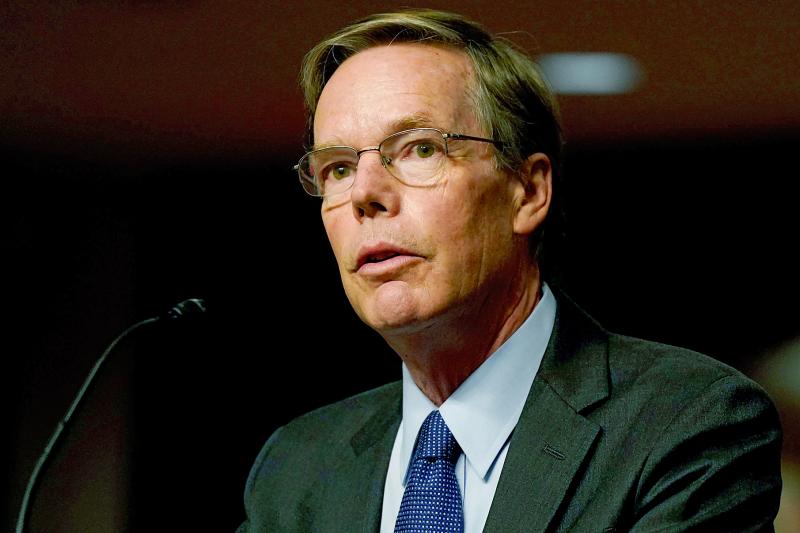
Photo: Reuters
“Beijing proclaims that the East is rising and the West is in decline,” Burns said. “I’m confident in our own country. The People’s Republic of China is not an Olympian power.”
Burns singled out China’s frequent incursions of Taiwan’s air defense identification zone as particularly egregious, saying it is clear that “they intend to take back Taiwan” and that the US needs to redouble efforts to prevent that from happening.
“Our responsibility is to make Taiwan a tough nut to crack,” Burns said, while dismissing a suggestion that the US ditch its policy of “strategic ambiguity.”
“We’re better off, and we’ll be more effective, in staying with the one China policy of the last four decades,” he said, without clarifying its position on Taiwan’s sovereignty.
In Taipei yesterday, the Ministry of Foreign Affairs thanked the Biden administration for reiterating the US’ commitment to Taiwan.
The threatening posture that Beijing has adopted toward Taiwan is affecting regional security and stability, ministry spokeswoman Joanne Ou (歐江安) said.
Many countries, including the US, have become increasingly alarmed by Beijing’s belligerence, Ou said, referring to what Burns had said at his confirmation hearing: “We certainly cannot trust the Chinese.”
Taiwan would continue to bolster its self-defense capabilities and safeguard its democracy, she added.
At a news briefing in Beijing, Chinese Ministry of Foreign Affairs spokesman Wang Wenbin (汪文斌) said that Burns’ remarks were “full of Cold War mentality,” urging him to “understand China in an objective manner” and not underestimate its determination to uphold its “legitimate rights.”
While Burns, 65, mentioned the importance of staying engaged with Beijing and finding common interests, his focus on areas of conflict won quick praise from US Republicans and Democrats on the committee as the hearing got under way.
The job of envoy to China “really demands a bipartisan approach,” said US Senator James Risch, the top Republican on the panel.
“You will be on the front lines of this competition,” Risch said.
Burns singled out the US’ network of alliances as one of the biggest advantages that it has when it comes to competing with China, which he said has few friends or allies to rely on.
In a rare aside for a Democrat in Washington, Burns even praised former US president Donald Trump and former US secretary of state Mike Pompeo for “reinvigorating” the Quad alliance with India, Japan and Australia, saying that it was an important bloc for the US in the Indo-Pacific region.
As a foreign service officer, Burns served as undersecretary of state for political affairs from 2005 to 2008, and also US ambassador to NATO from 2001 to 2005 and ambassador to Greece from 1997 to 2001.
He currently serves as a professor at Harvard Kennedy School.
Additional reporting by staff writer
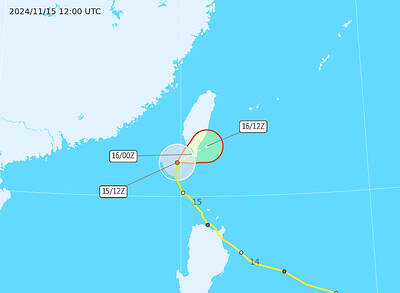
Typhoon Usagi yesterday had weakened into a tropical storm, but a land warning issued by the Central Weather Administration (CWA) was still in effect in four areas in southern Taiwan. As of 5pm yesterday, Tropical Storm Usagi was over waters 120km south-southwest of Oluanpi (鵝鑾鼻), the southernmost tip of Taiwan proper, and was moving north at 9kph, CWA data showed. The storm was expected to veer northeast later yesterday. It had maximum sustained winds of 101kph, with gusts of up to 126kph, the data showed. The CWA urged residents of Kaohsiung, Pingtung County, Taitung County and the Hengchun Peninsula (恆春) to remain alert to
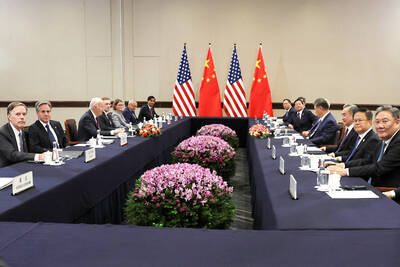
ONE LAST TALK: While Xi said that Taiwan was a ‘red line,’ Biden, in what is likely his last meeting with Xi as president, called for an end to China’s military activity around Taiwan China’s military intimidation and economic coercion against Taiwan are the main causes of tensions that are destabilizing peace in the Taiwan Strait, Taipei said yesterday while thanking US President Joe Biden for expressing Washington’s firm stance of maintaining peace and stability in the region. Biden and Chinese President Xi Jinping (習近平) met on Saturday for their third meeting and their first talks in seven months on the sidelines of the APEC forum in Lima, Peru. It was likely Biden’s last meeting as president with Xi. During their conversation, Biden reiterated the US’ opposition to any unilateral change to the “status quo” from either
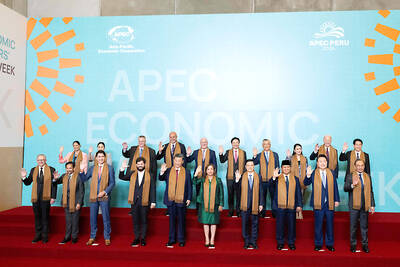
Taiwan would participate in the 2026 APEC summit to be hosted by China after Beijing promised it would ensure the personal safety of attendees, Taiwanese national security sources said yesterday. The APEC Leaders’ Machu Picchu Declaration announced yesterday said that China would host the APEC summit in 2026. Beijing proposed hosting the summit shortly before this year’s gathering began on Friday, a national security official said, speaking on condition of anonymity. Many APEC members expressed concerns about China hosting the event and said that prior communication over the decision was insufficient, the official said. Taiwan brought up concerns about legal “guidelines” China announced in
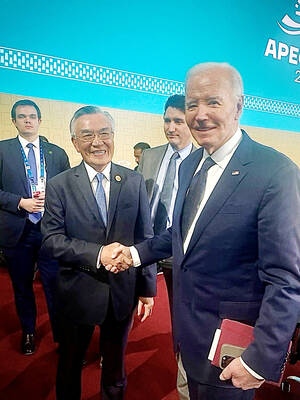
MEET AND GREET: The White House, which called the interaction ‘just a handshake,’ did not immediately respond to a request for comment on whether Biden planned to visit Taiwan’s envoy to the APEC summit, Lin Hsin-i (林信義), on Friday invited US President Joe Biden to visit Taiwan. During the APEC Leaders’ Informal Dialogue, Lin, who represented President William Lai (賴清德) at the summit, spoke with Biden and expressed gratitude to the outgoing US president for his contribution to improving bilateral ties between Taipei and Washington over the past four years, the Ministry of Foreign Affairs said. Lin and Biden exchanged views during the conversation, with Lin extending an invitation to Biden to visit Taiwan, it said. Biden is to step down in January next year, when US president-elect Donald Trump is